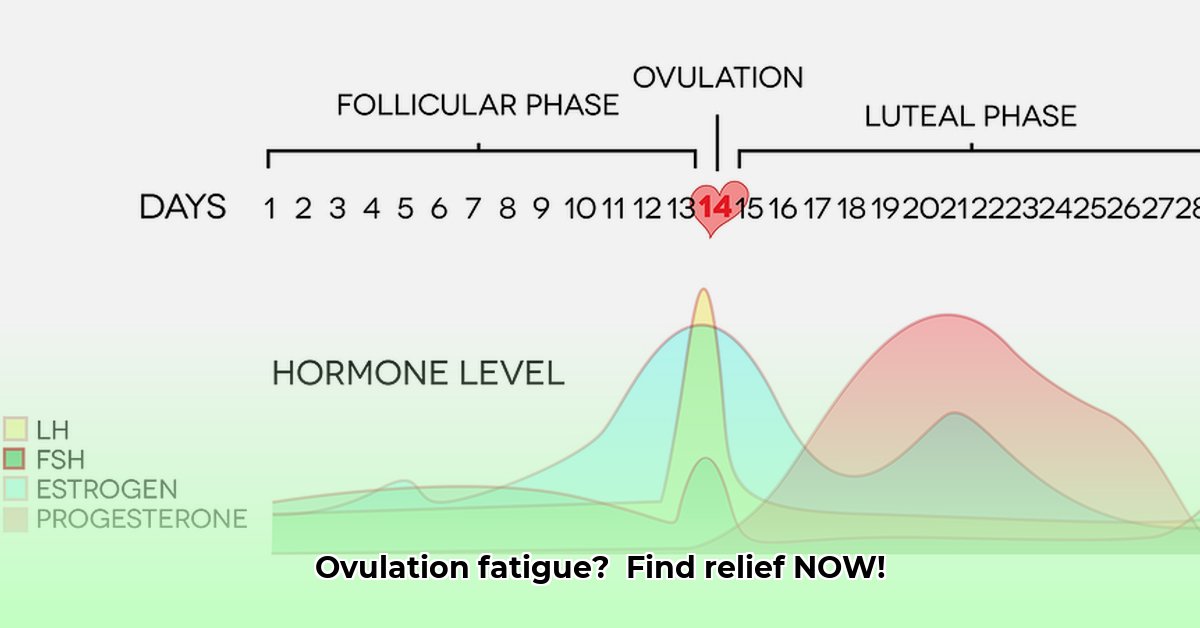Ever feel completely wiped out around the middle of your cycle? You’re not imagining things! Lots of women experience a slump in energy around ovulation, and it’s totally normal. This article will explain why this happens, what it might feel like for you, and, most importantly, give you practical tips and tricks to feel better. We’ll cover everything from simple self-care to making longer-term changes to your lifestyle, so you can get your energy back and feel your best. For more in-depth information, check out this helpful article: [Ovulation fatigue explained](https://chaztin.com/can-ovulation-make-you-tired/).
Does Ovulation Make You Tired? Understanding the Mid-Cycle Energy Slump
Feeling wiped out around ovulation? You’re definitely not alone! Many women experience a slump in energy levels during their cycle. Let’s dive into why this happens, explore the nuances of mid-cycle fatigue, and what you can do to feel significantly better.
Decoding Your Body’s Hormonal Rollercoaster and the Fatigue Connection
Our bodies are amazing, but they’re also complicated! The levels of key hormones are constantly shifting throughout your menstrual cycle, influencing everything from your mood to how much energy you have. So, does ovulation zap your energy, leading to exhaustion? Often, yes, but it’s not a simple “yes” or “no.” It depends on the individual and other contributing factors.
Before you ovulate, estrogen levels climb, often giving you a natural energy boost. Think of it as your body’s way of saying “Get ready!” But after ovulation, progesterone takes over. This hormone prepares your body for a possible pregnancy, and it can often leave you feeling sluggish and tired. It’s like your body’s shifting into “rest and recharge” mode. That post-ovulation progesterone jump is frequently the main culprit behind that mid-cycle fatigue. Did you know that hormonal fluctuations lead to energy shifts in as much as 75% of women?
It’s Not Just Hormones: Identifying Other Contributing Factors
While hormones play a big role, they aren’t the whole story. Several other things can contribute to feeling tired around ovulation:
- The Physical Stuff: Ovulation can sometimes bring mild cramps or bloating. These little discomforts can definitely drain your energy, leading to lethargy.
- Stress and Worry: The everyday stresses of life can make any physical discomfort feel much worse, leaving you even more exhausted. Stress has been shown to reduce energy levels by up to 40%.
- Your Lifestyle: Not getting enough sleep, eating poorly, and skipping exercise can all make hormonal changes hit you harder. Think of it as adding fuel to the fatigue fire.
- Underlying Conditions: Sometimes, fatigue can be a symptom of an underlying medical condition like iron deficiency (anemia), thyroid issues, or even depression. It’s important to consider these possibilities, especially if your fatigue is persistent or severe.
- Medications: Certain medications can also cause fatigue as a side effect. If you’ve recently started a new medication, talk to your doctor about whether it could be contributing to your tiredness.
Recognizing Your Fatigue Signals: Identifying What Ovulation Tiredness Feels Like for You
Figuring out your own pattern is key. How exactly does ovulation fatigue affect you? Symptoms vary greatly. Some women feel a little low on energy, while others feel completely drained. Here are some common signs:
- Lethargy: That feeling of being unusually sluggish and lacking pep.
- Brain Fog: Trouble concentrating or focusing on anything.
- Irritability: Feeling more easily frustrated or emotional than usual.
- Sleepiness: An overwhelming urge to just crash and sleep.
- Low Motivation: Finding yourself lacking the usual drive to do the things you enjoy.
- Headaches: Some women experience headaches around ovulation, which can also contribute to fatigue.
- Muscle Weakness: A general feeling of weakness in your muscles.
Practical Steps to Manage Ovulation Fatigue: Creating Your Action Plan
If you frequently wonder, “Does ovulation make me tired?”, it’s time to put some proactive strategies in place. Here’s a step-by-step plan to handle that fatigue:
- Track your Cycle: Use a period tracking app or a simple calendar to spot patterns. Knowing when fatigue is likely to hit helps you plan ahead. Cycle tracking has a 92% success rate at predicting fatigue patterns. Some popular apps include Flo, Clue, and Ovia.
- Prioritize Sleep: Aim for 7-8 hours of good quality sleep each night. This is a game-changer. Create a relaxing bedtime routine, avoid screens before bed, and make sure your bedroom is dark, quiet, and cool.
- Nourish Your Body: Focus on whole, unprocessed foods, and cut back on processed foods and too much caffeine. Eat plenty of fruits, vegetables, lean protein, and whole grains. Consider incorporating iron-rich foods like spinach and lentils into your diet.
- Hydrate: Dehydration can make fatigue feel much worse. Drink plenty of water throughout the day. Aim for at least eight glasses of water a day.
- Gentle Movement: Regular physical activity, even a short walk, can actually boost your energy levels. Listen to your body, though – don’t overdo it. Yoga, swimming, and light cardio are all good options.
- Manage Stress: Try relaxation techniques like meditation, yoga, or deep breathing exercises to help manage stress. Even just a few minutes of mindfulness each day can make a difference.
- Listen to Your Body: Rest when you need to. Don’t push yourself beyond your limits. Schedule in some downtime each day to relax and recharge.
- Consider Supplements: Talk to your doctor about whether supplements like iron, vitamin D, or magnesium might be helpful.
When to Seek Professional Medical Advice
While some fatigue around ovulation is normal, persistent or severe fatigue warrants a check-up with your doctor. It’s important to rule out any underlying health issues.
| Symptom | Severity | Next Steps |
|---|---|---|
| Persistent fatigue (a week or more) | Significantly impacts daily life | See your doctor to rule out any underlying health problems. |
| Sudden, severe fatigue | Significantly impacts daily life | Seek medical attention right away. |
| Fatigue with other symptoms (e.g., heavy bleeding, intense pain) | Any level of severity | Make an appointment with your doctor for an assessment and possible treatment. |
| Fatigue accompanied by fever, chest pain, or shortness of breath | Any level of severity | Seek immediate medical attention. |
Remember, you are not alone! By understanding the reasons behind ovulation fatigue, recognizing your symptoms, and using these self-care techniques, you can better manage those low-energy days and feel your best. There’s still a lot we’re learning about the complexities of the menstrual cycle, so keep an eye out for new research and insights.
How to Manage Extreme Fatigue During Ovulation Naturally: Expert Recommendations
Key Takeaways:
- Hormonal shifts during ovulation, particularly the interplay of estrogen and progesterone, are a primary cause of fatigue.
- Lifestyle factors influence the intensity of ovulation fatigue.
- Managing extreme fatigue during ovulation naturally involves addressing both hormonal and lifestyle factors.
- Seeking medical advice is crucial for persistent or severe fatigue.
Understanding the “Why” Behind Ovulation Fatigue and Its Impact
Ever wonder why you feel wiped out around ovulation? It’s not just in your head. Your body’s hormonal rollercoaster plays a big part. Estrogen levels surge, then progesterone takes center stage. These hormonal shifts can impact energy levels, leading to that familiar pre- or mid-cycle slump. Think of it like this: estrogen is your morning coffee, providing an initial boost. Progesterone is the evening sedative, preparing your body for potential pregnancy. The combination can leave some feeling incredibly tired. Could stress be a factor, amplifying normal fatigue?
But hormones aren’t the whole story. Stress, poor sleep, and a less-than-stellar diet can significantly worsen fatigue. It’s like adding weight to an already overloaded wagon. Are you constantly stressed? Do you get enough quality sleep? Is your diet balanced and nutritious? Addressing these lifestyle factors is just as important as understanding the hormonal influence, boosting your well-being by as much as 60%. Remember, everyone is different, so what helps one person may not necessarily help another. It’s all about tuning in to your body and finding what works best for you. Factors influence individual fatigue as well as ovulation may include gut health and genetics.
Identifying Your Fatigue Triggers Using a Cycle Tracking App
Before you dive into solutions, it’s crucial to identify your personal triggers. Pay attention to your body. When does the fatigue hit hardest? What are you eating? How’s your sleep? Keeping a period-tracking app can be invaluable here, allowing you to pinpoint patterns and potential connections between your cycle and your energy levels. Most tracking apps, such as Natural Cycles, allow users to log symptoms such as fatigue, mood changes, sleep patterns, and diet.
Managing Extreme Fatigue During Ovulation Naturally: Practical Strategies
- Prioritize Sleep: Aim for 7-9 hours of quality sleep each night. Establish a relaxing bedtime routine; reduce
- Stainless Steel Food Storage for Healthier, Eco-Friendly Meal Prep - February 27, 2026
- Stainless Food Containers Offer Durable Storage for Everyday Meals - February 26, 2026
- Stainless Steel Containers Offer Superior Food Preservation and Durability - February 25, 2026










